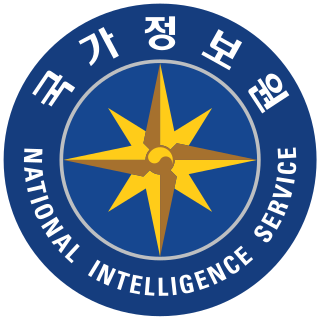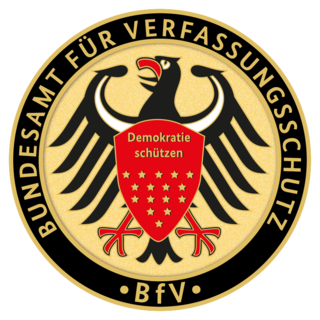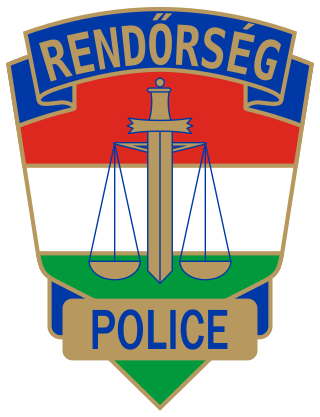Espionage, spying, or intelligence gathering is the act of obtaining secret or confidential information (intelligence). A person who commits espionage is called an espionage agent or spy. Any individual or spy ring, in the service of a government, company, criminal organization, or independent operation, can commit espionage. The practice is clandestine, as it is by definition unwelcome. In some circumstances, it may be a legal tool of law enforcement and in others, it may be illegal and punishable by law.

The police are a constituted body of persons empowered by a state, with the aim to enforce the law, protect public order, and the public itself. This commonly includes ensuring the safety, health, and possessions of citizens, and to prevent crime and civil disorder. Their lawful powers encompass arrest and the use of force legitimized by the state via the monopoly on violence. The term is most commonly associated with the police forces of a sovereign state that are authorized to exercise the police power of that state within a defined legal or territorial area of responsibility. Police forces are often defined as being separate from the military and other organizations involved in the defense of the state against foreign aggressors; however, gendarmerie are military units charged with civil policing. Police forces are usually public sector services, funded through taxes.

The Security Service, also known as MI5, is the United Kingdom's domestic counter-intelligence and security agency and is part of its intelligence machinery alongside the Secret Intelligence Service (MI6), Government Communications Headquarters (GCHQ), and Defence Intelligence (DI). MI5 is directed by the Joint Intelligence Committee (JIC), and the service is bound by the Security Service Act 1989. The service is directed to protect British parliamentary democracy and economic interests and to counter terrorism and espionage within the United Kingdom (UK).

The Defense Intelligence Agency (DIA) is an intelligence agency and combat support agency of the United States Department of Defense, specializing in defense and military intelligence.

Secret police are police, intelligence, or security agencies that engage in covert operations against a government's political, religious, or social opponents and dissidents. Secret police organizations are characteristic of authoritarian and totalitarian regimes. They protect the political power of a dictator or regime and often operate outside the law to repress dissidents and weaken political opposition, frequently using violence. They may enjoy legal sanction to hold and charge suspects without ever identifying their organization.

Counterintelligence (counter-intelligence) or counterespionage (counter-espionage) is any activity aimed at protecting an agency's intelligence program from an opposition's intelligence service. It includes gathering information and conducting activities to prevent espionage, sabotage, assassinations or other intelligence activities conducted by, for, or on behalf of foreign powers, organizations or persons.

Mass surveillance is the intricate surveillance of an entire or a substantial fraction of a population in order to monitor that group of citizens. The surveillance is often carried out by local and federal governments or governmental organizations, such as organizations like the NSA, but it may also be carried out by corporations. Depending on each nation's laws and judicial systems, the legality of and the permission required to engage in mass surveillance varies. It is the single most indicative distinguishing trait of totalitarian regimes. It is also often distinguished from targeted surveillance.
A covert operation or undercover operation is a military or police operation involving a covert agent or troops acting under an assumed cover to conceal the identity of the party responsible. Some of the covert operations are also clandestine operations which are performed in secret and meant to stay secret, though many are not.
A security agency is a governmental organization that conducts intelligence activities for the internal security of a nation. They are the domestic cousins of foreign intelligence agencies, and typically conduct counterintelligence to thwart other countries' foreign intelligence efforts.

Security police usually describes a law enforcement agency which focuses primarily on providing security and law enforcement services to particular areas or specific properties. They may be employed by governmental, public, or private institutions. Security police are generally considered distinct from security guards as security police personnel typically hold some level of law enforcement authority. The exact powers held by security police vary widely between jurisdictions. Examples of these types of agencies include the U.S. FBI Police, the Indian Central Industrial Security Force, and the British Civil Nuclear Constabulary.
A cover in foreign, military or police human intelligence or counterintelligence is the ostensible identity and/or role or position in an infiltrated organization assumed by a covert agent during a covert operation.

The National Intelligence Service is the chief intelligence agency of South Korea. The agency was officially established in 1961 as the Korean Central Intelligence Agency, during the rule of general Park Chung Hee’s military Supreme Council for National Reconstruction, which displaced the Second Republic of Korea. The original duties of the KCIA were to supervise and coordinate both international and domestic intelligence activities and criminal investigations by all government intelligence agencies, including that of the military. The agency’s broad powers allowed it to actively intervene in politics. Agents undergo years of training and checks before they are officially inducted and receive their first assignments.

The Federal Office for the Protection of the Constitution is Germany's federal domestic intelligence agency. Together with the Landesämter für Verfassungsschutz (LfV) at the state level, the federal agency is tasked with intelligence-gathering on efforts against the liberal democratic basic order, the existence and security of the federation or one of its states, and the peaceful coexistence of peoples; with counter-intelligence; and with protective security and counter-sabotage. The BfV reports to the Federal Ministry of the Interior and tasks and powers are regulated in the Bundesverfassungsschutzgesetz. The President is Thomas Haldenwang; he was appointed in 2018.

Law enforcement in Hungary is split among the Police and Border Guards, and the Customs and Excise Authority. Since 2006, the Police has been subject to the Ministry of Justice, when the Ministry of Interior was re-structured to deal with Municipalities and Regional Development. Due to Hungary's accession to the Schengen Treaty, the Police and Border Guards were merged into a single national corps, with the Border Guards becoming Police Officers. This merger took place in January 2008. The Customs and Excise Authority remained to be subject to the Ministry of Finance.
High policing is a form of intelligence-led policing that serves to protect the national government or a conglomerate of national governments from internal threats; that is, any policing operations integrated into domestic intelligence gathering, national security, or international security operations for the purpose of protecting government.
The counter-terrorism page primarily deals with special police or military organizations that carry out arrest or direct combat with terrorists. This page deals with the other aspects of counter-terrorism:

The Security Intelligence Agency is a national security and intelligence agency of Serbia. The agency is responsible for collecting, reporting and disseminating intelligence, and conducting counterintelligence in the interest of Serbia's national security.

Counterintelligence state is a state where the state security service penetrates and permeates all societal institutions, including the military. The term has been applied by historians and political commentators to the former Soviet Union, the former German Democratic Republic, Cuba after the 1959 revolution, Iraq under Saddam Hussein, China under the Chinese Communist Party (CCP), and post-Soviet Russia under Vladimir Putin, especially since 2012.

National Police Corps, colloquially in English as Dutch National Police or National Police Force, is divided in ten regional units, two national units, the police academy, police services center, and national dispatch center cooperation. The law-enforcement purposes of these agencies are the investigation of suspected criminal activity, referral of the results of investigations to the courts, and the temporary detention of suspected criminals pending judicial action. Law enforcement agencies, to varying degrees at different levels of government and in different agencies, are also commonly charged with the responsibilities of deterring criminal activity and preventing the successful commission of crimes in progress. The police commissioner in the Netherlands is Janny Knol since March 1, 2024.
A law enforcement agency (LEA) is any government agency responsible for law enforcement within a specific jurisdiction through the employment and deployment of law enforcement officers and their resources. The most common type of law enforcement agency is the police, but various other forms exist as well, including agencies that focus on specific legal violation, or are organized and overseen by certain authorities. They typically have various powers and legal rights to allow them to perform their duties, such as the power of arrest and the use of force.











